Want to learn some Japanese proverbs?
Good! Knowing proverbs teaches you language and culture at the same time.
Japanese is full of them and in this series, I’m breaking Japanese proverbs down word by word.
That way….
- You learn more Japanese words
- Master some Japanese proverbs, sayings
- Gain insight into Japanese culture
- And use them in your Japanese conversations
You can even use them as Japanese tattoo phrases.
So, let’s look at some common Japanese proverbs and sayings.

Want a bundle of 30+ Japanese PDF Lessons? These colorful and printable PDFs teach you Japanese phrases… and they’re free for new learners. Click here to get Japanese PDF Lessons.
1) 寄らば大樹の陰 – Yoraba taiju no kage
- 陰 – Kage – Shade, shadow
- 寄る – Yoru – To drop in, visit
- 大樹 – Taiju – Large tree
Meaning: If you take shade, do it under a large tree.
In other words, serve the powerful for your own good. Help them and they will help you. Like a big tree.
Key words:
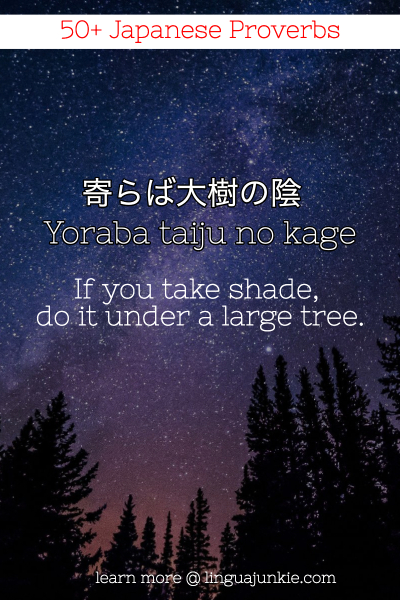
2) ただより高いものはない – Tada yori takai mono wa nai
Meaning: Nothing is more expensive than free.
This refers to all the things that people do for you for free.
Those are harder to repay, where as money is easier to repay.
Key words:
- ただ – Tada – Free
- 高い – Takai – Expensive
- 物 – Mono – Thing

3) 多芸は無芸 – Tagei wa mugei
Meaning: Many skills is no skill.
A jack of all trades, but in a bad way. You’re decent at a lot of things, but not a genius in one single skill because you’re spread so far.
Key words:
- 多芸 – Tagei – Versatility or talent
- 無芸 – Mugei – Lacking talent or accomplishments

4) 大器晩成 – Taiki bansei
Meaning: Great talents mature late.
Or you can interpret it as “great men succeed in their later years.” Suck it, Mark Zuckerberg. Just to reinforce that time is the essential to developing amazing skill… and most us young people don’t get that.
Key words:
- 大器 – Taiki – Person of great talent
- 晩成 – Bansei – Late bloomer, late completion
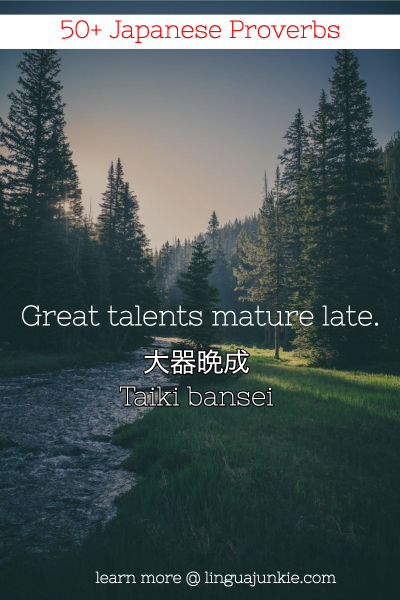
5) 初心忘るべからず – Shoshin wasuru bekarazu
Meaning: Remember/where you came from/Should not forget our original intention.
Thus, can be interpreted as “we shouldn’t forget our beginner’s spirit” when we were so excited. “Yea! Let’s learn Japanese!” More experienced learners tend to lose their excitement that had them motivated, because of all that work they’re doing. So, remember this Japanese proverb and don’t forget your spirit!
Key words:
- 初心 – Shoshin – Original intention, inital resolution
- 忘る – Wasuru – To forget
- べからず – Bekarazu – Should/must not

6) 小打も積もれば大木を倒す – Shōda mo tsumoreba taiboku-wo taosu
Meaning: With many little strokes a large tree is felled.
Small consistent actions allow you to reach a greater goal. So, if you keep striking at the tree, every day, non-stop, that tree will eventually fall. (Poor tree :(…)
One of my most favorite Japanese proverbs.
Key words:
- 小 – Shou – Small
- 打 – comes from the verb – utsu – to hit, but has the reading “da”
- 積もる – Tsumoru – To pile Up, Accumulate
- 大木 – Taiboku – Large tree. (Hmm, there’s a different variation of “large tree mentioned above.)
- 倒す – Taosu – To defeat, to knock down, to bring down
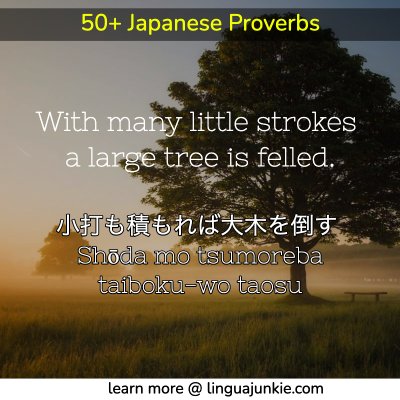
7) 盛年重ねて来らず – Seinen kasanete kitarazu
Meaning: The prime of your life does not come twice.
Essentially, this how you say “YOLO” in Japanese. You’re only young once and youth won’t come back! That is, unless technology finds a way, long after I write this.
Key words:
- 盛年 – Seinen – Prime of Life
- 重ねて – Kasanete – Once more, repeatedly

8) 酒は本心を表す – Sake wa honshin wo arawasu
Meaning: Alcohol (Sake) reveals true feelings.
Alcohol, meaning, sake…as that’s the top alcohol of choice in Japan. And as all things, the Japanese are not invincible to the honest effects of alcohol either.
Key words:
- 本心 – Honshin – True feelings
- 表す– Arawasu – To reveal
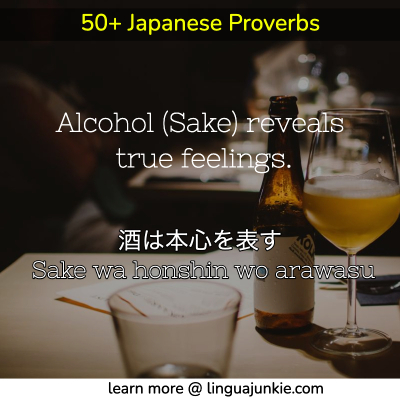
9) 七転び八起き – Nanakorobi yaoki
Meaning: Fall seven times, stand up eight.
Oh, you fell while learning Japanese? Well, too bad. Get up again. LinguaJunkie said so. Just some more Japanese inspiration coming your way in the form of a proverb.
Key words:
- 転ぶ – Korobu – To fall down
- 起きる – Okiru – To get up, Rise, Wake up
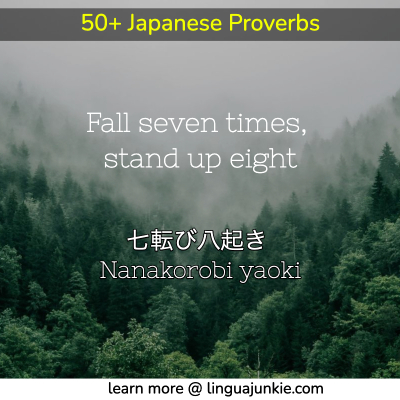
10) 雨降って地固まる – Ame futte ji katamaru
Meaning: After the rain, the earth hardens
Ground that gets rained on, hardens. In other words, adversity builds character. Another one of the great Japanese proverbs to know.
Key words:
- 雨 – Ame – Rain
- 降る – To fall, precipitate (only referring to rain or snow)
- 地 – Ji – Ground, earth
- 固まる – Katamaru – To harden, to become firm
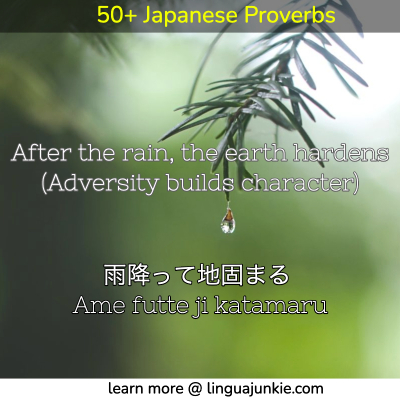
11) ローマは一日にしてならず – Ro-ma wa ichinichi ni shite narazu
Meaning: Rome wasn’t build in a day.
Did you really need more of an explanation for this? Awesome things aren’t accomplished in a day. Keep striking at that big tree.
Key words:
- ローマ – Ro-ma – Rome
- 一日 – Ichinichi – One Day
12) 鳴く猫はねずみを捕らぬ – Naku neko wa nezumi o toranu
Meaning: A loud (meowing) cat doesn’t get mice.
Meow! Well, this is obvious, isn’t it? Don’t talk about it, do it. Real cats don’t meow about how they’ll catch mice, they stalk them quietly and attack with bloodthirsty fervor!
Key words:
- 鳴く – Naku – To make a sound (an all inclusive “to cry/make a sound” for animals – as in, cats meow, dogs bark, birds chirp, etc.)
- ネズミ – Nezumi – Mouse
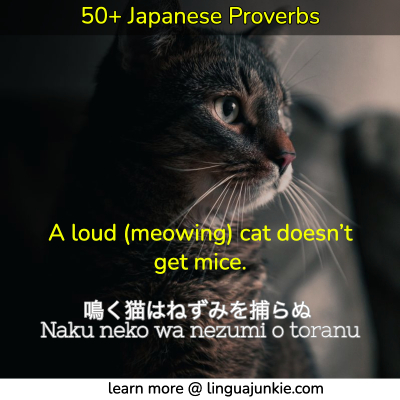
13) 疑心暗鬼 – Gishin Anki
Meaning: Suspicion will raise demons.
Once you become suspicious, everything is suspicious. And thus, a doubtful mind creates it’s own devils and sets itself up for failure. Not a good thing.
Key words:
- 疑心 – Gishin – Doubt, Suspicion
- 暗 – The kanji for darkness. Like, 暗い (Kurai) means dark.
- 鬼 – Ki – Demon
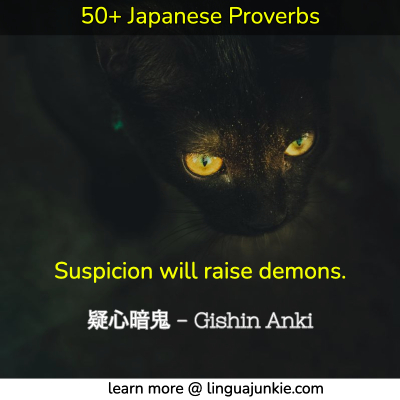
14) 刃に強き者は礼にすぐる – Ha ni tsuyoki-sha wa rei ni suguru
Meaning: Those who are strong with the blade are good at courtesy.
Discipline and manners are very much built into martial arts, which is where this proverb comes into play.
You can think of this with professional fighters who are extra courteous and polite with someone who isn’t, because they know what they are capable of.
- 刃 (Ha) – “blade” or “edge.”
- 強き (tsuyoki) – “strong” or “powerful.”
- 者 (mono) – “person” or “individual.”
- 礼 (rei) – “courtesy” or “manners.”
- すぐる (suguru) – “to surpass” or “to exceed.”

15) 井の中の蛙大海を知らず – I no naka no kawazu taiki o shirazu
Meaning: A frog in a well does not know the great sea.
Pretty much used for ignorant people that are sitting in their own wells, unaware of the great sea out there. It’s used to encourage someone to get a wider perspective.
Key words:
- 井 – I – Well
- 中 – Naka – Inside
- 蛙 – Kaeru – Frog
- 大海 – Taikai – Ocean, large sea
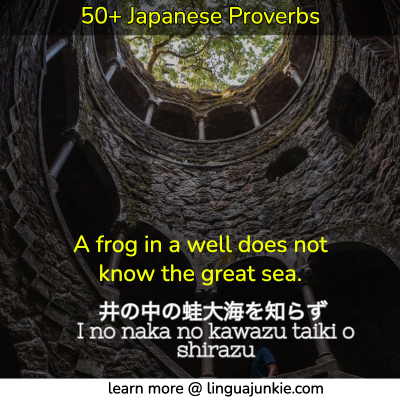
16) 人のふり見てわがふり直せ – Hito no furi mite waga furi naose
Meaning: Watch a person’s behavior and correct your own behavior.
In other words, one man’s fault is another man’s lesson. Watch, observe, and learn.
Key words:
- 振り – Furi – Behaviour, appearance
- 我 – Waga – One’s own, your own
- 直す – Naosu – To correct, to fix
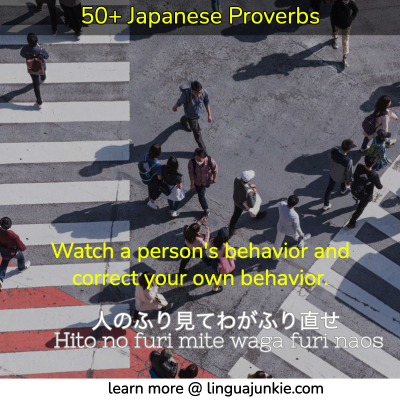
17) 会うは別れの始め – Au ha wakare no hajime
Meaning: To meet is the beginning of parting
Things constantly change in life. Just a Buddhist observation that as soon as you meet someone, you will soon part with them.
Key words:
- 会う – Au – To meet
- 別れ – Wakare – Parting, separation
- 始まり – Hajimari – Beginning
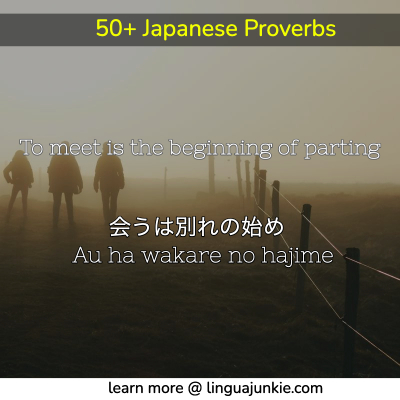
18) 忙中閑あり- Bouchuu kan ari
Meaning: In the midst of busyness, there is free time.
Don’t have enough time to learn Japanese? Don’t lie to yourself, you coconut. There IS free time; you’re just operating by hard and fast rules that prevent you from doing so. And ultimately, those rules don’t matter. Take a break. Maybe a nap. Eat a cake. Hell, eat the whole cake, you deserve it.
Key words:
- 忙中 – Bouchuu – (in the midst of) Busyness
- 閑 – Hima – Free time, leisure
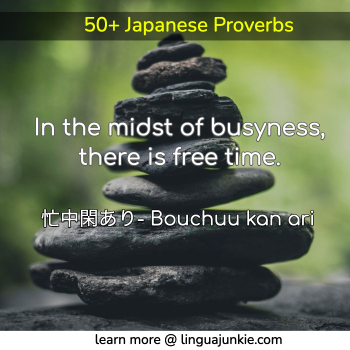
19) 千里の道も一歩から – Senri no michi mo ippo kara
Meaning: A journey of a thousand miles begins with the first step.
Well, how do you think people learn Japanese? They open the big, grand book that’ll teach them everything, then shut themselves indoors for 5 years and don’t come out ’til they’re ready? No! Everything takes a first, small step. You’re thinking too much.
Take a step!
Key words:
- 千里 – Senri – A long distance (journey)
- 道 – Michi – Way, path, course
- 一歩 – Ippo – A step
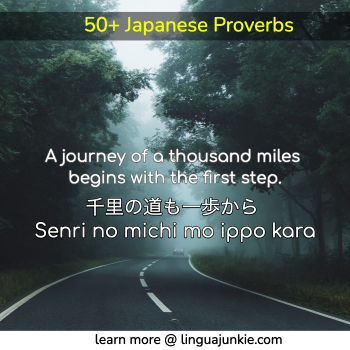
20) 継続は力なり – Keizoku ha chikara nari
Meaning: Perseverance is power.
Just another way of saying – stick with it – brah. A big tree can be felled by a ton of small strikes. Fall seven times, get up eight. Persevere!
Key words:
- 継続 – Keizoku – Continuation
- 力 – Chikara – Power
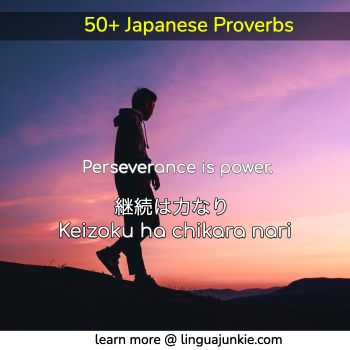
21) 知らぬが仏。Shiranu ga Hotoke.
- Meaning: Not knowing is Buddha.
Meaning, ignorance is bliss. Buddha was pretty blissful and peaceful. Why? Because he didn’t need to know everything.
Key words:
- 仏 – Hotoke – Buddha
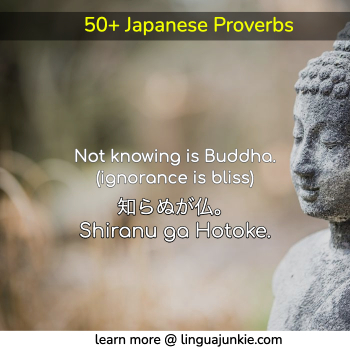
22) 出る杭は打たれる。 Deru kui wa utareru.
- Meaning: The stake that stands out is struck.
Ah, one of the most common Japanese proverbs.
You all know it as “the nail that sticks out gets hammered in.” True of Japanese culture to conform, but of course, intentions and thoughts may differ, despite the conforming looks.
Key words:
- 出る – Deru – To come out
- 杭 – Kui – Stake
- 打たれる – Utareru – To get beaten, struck (passive form)
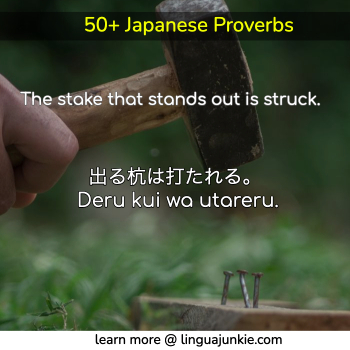
23) 後悔先に立たず Kōkai saki ni tatazu
- Meaning: Regret does not come first.
- Alternative: No use crying over spilled milk.
Wondering how could you regret something first?
Well, you can’t. You can’t regret what you haven’t done.
This proverb says that worrying about something before it happens is not good. It also implies we can’t predict every outcome and regret is an unavoidable part of taking action. And, that you should take action anyway.
Key words:
- 後悔– koukai – regret
24) 三日坊主。Mikka Bouzu.
- Meaning: 3 Day Monk.
What’s a 3 Day Monk? Well, it’s someone that wanted to be a monk, tried for 3 days, and gave up. Or, someone that tried learning Japanese… and then gave up. Or… someone that wanted to be this awesome, super talented person that at the end of the day, couldn’t leave their couch.
Know anyone like that?
Key words:
- 三日 – mikka – day 3 of a month, three days
- 坊主 – bouzu – buddhist priest
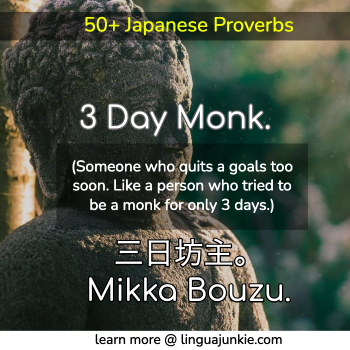
25) 馬鹿は死ななきゃ治らない。 Baka wa shinanakya naoranai.
- Meaning: Unless an idiot dies, he won’t be cured.
Ouch. Well, in nicer English, this can also be translated as “once a fool, always a fool.” But yeah, pretty extreme from a polite culture.
Key words:
- 馬鹿 – Baka – Fool
- 死ぬ – Shinu – To die
- 治る – Naoru – To be cured
26) 門前の小僧習わぬ経を読む。 Monzen no kozō narawanu kyō wo yomu.
- Meaning: A young priest will read scriptures before a gate.
Why is he reading the Buddhist scriptures before a gate? Well, he’s a Buddhist priest, at a Buddhist temple. What else is he to do, but practice Buddhism and learn about it? Why? It’s his environment, duh.
And that’s the full meaning of this proverb: The environment makes our characters.
Key words:
- 門前 – Monzen – Before a gate
- 小僧 – Kozou – Young buddhist priest
- 経 – Kyou – Buddhist scriptures
- 読む – Yomu – to read
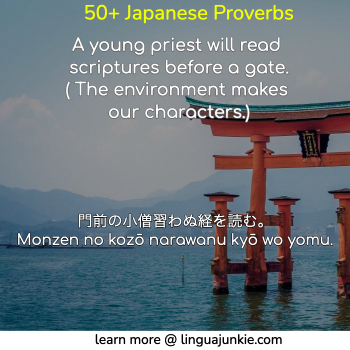
27) 沈む瀬あれば浮かぶ瀬あり。Shizumu se areba ukabu se ari.
- Meaning: If there’s a sinking current, it’ll get a chance.
Or in other words, any sinking current rise again. When life has its downs, there will be ups. Such is the nature of life. Accept it, and stop worrying about things.
Key words:
- 沈む – Shizumu – To sink
- 瀬 – Se – Current or shallow
- 浮かぶ瀬 – Ukabuse – Chance, opportunity, lucky break
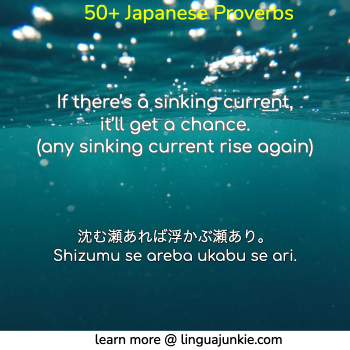
28) 焼け石に水。Yake ishi ni mizu.
- Literal meaning: Water on a burning/hot rock
Ever tried putting out a burning rock with water? Yeah, I haven’t either.
But from I’m told, it won’t work. It’s useless. And such is the meaning of the proverb. Pouring water on a burning rock is inadequate. Or, something is bound to fail with inadequate effort.
Key words:
- 焼ける – Yakeru – To burn
- 石 – Ishi – Rock
- 水 – Mizu – Water
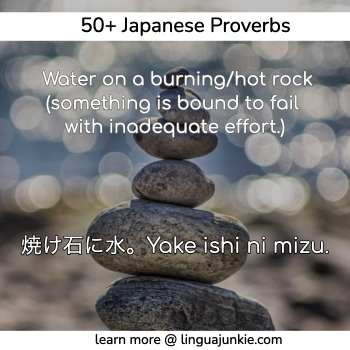
29) 十人十色 。Juunin, toiro.
- Literal Meaning: Ten men, ten colors.
Ten men and ten different colors. Every one is different. Oh! So despite stakes that stick out getting hammered down, there is indeed acknowledgement that we’re all different. And you thought you could judge a culture completely based on a proverb.
Key words:
- 十 – Juu – Ten
- 人 – Nin – Person
- 色 – Iro – Color
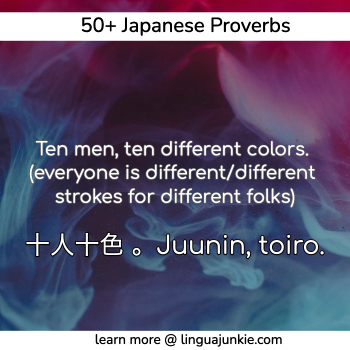
30) 押してもダメなら引いてみな。Oshite-mo dame-nara hiite mina.
- Literal Meaning: If pushing doesn’t work, try pulling.
Oh, learning Japanese didn’t work with anime? Well then, try a textbook or a podcast. Or maybe even a tutor. Instead of quitting, it’s better to change up your methods and keep trying.
Key words:
- 押す – Osu – To push
- ダメ – Dame – No good
- 引く- Hiku – To pull
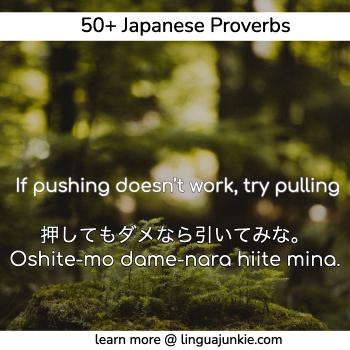
31) 能ある鷹は爪を隠す。No aru taka-wa tsume-wo kakusu.
- Literal Meaning: A skilled falcon hides its talons.
Because, why show off your skills and talents? Use them when to your advantage when no one expects it. BAM! In poker, you don’t show your hand and the wise don’t show off. There’s no need.
This is one of my favorite Japanese proverbs.
Key words:
- 能 – Nou – Talent
- 鷹 – Taka – Falcon
- 爪 – Tsume – Talons
- 隠す – Kakusu – To hide
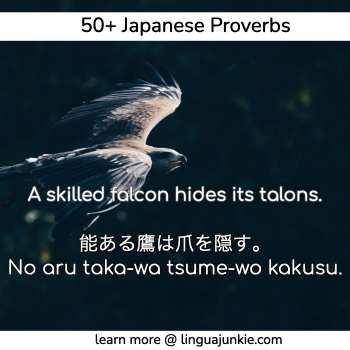
32. 下手があるので上手が知る – Heta ga aru node jouzu ga shiru.
- Meaning: We recognize skill because there is lack of skill.
This is a Japanese variation of Sturgeons law (ninety percent of everything is crap) in proverb form. Because there’s a lack of skill all over the place, skill and talent are easy to see.
Key words:
- 下手 – Heta – Unskillful
- 上手 – Jouzu – Skillful
- 知る – Shiru – To know, to be aware of
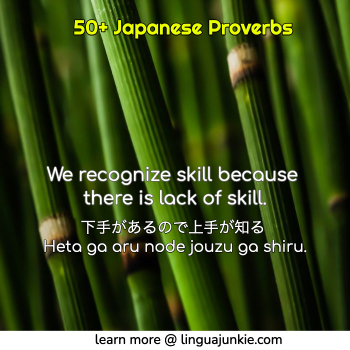
33) 明日は明日、今日は今日 – Ashita wa ashita, kyo wa kyou.
- Meaning: Tomorrow is tomorrow, today is today.
Worry about today, because tomorrow will come tomorrow. Priorities first. One day at a time. That type of thing.
Key words:
- 明日 – Ashita – Tomorrow
- 今日 – Kyou – Today
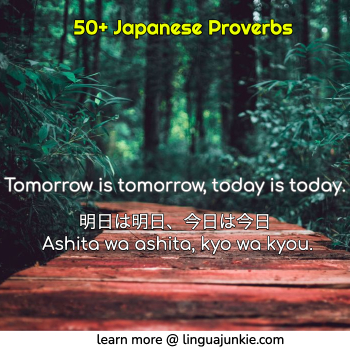
34) 顔は心の鏡なり – Kao ha kokoro no kagami nari
- Meaning: The face becomes a mirror of the soul.
What? You can’t judge a book by its cover? Well, you’d be surprised, your face (a.k.a. your cover) reveals a lot about what’s going on inside.
Key words:
- 顔 – Kao – Face
- 心 – Kokoro – Heart, spirit, mind
- 鏡 – Kagami – Mirror

35) 隣の花は赤い – Tonari no hana wa akai
- Meaning: The flowers next door are red.
In other words, the grass is greener on the other side. But in this case, it’s flowers, and they’re red. You jelly?
Key words:
- 隣 – Tonari – Neighbor, next to
- 花 – Hana – Flower
- 赤い – Akai – Red
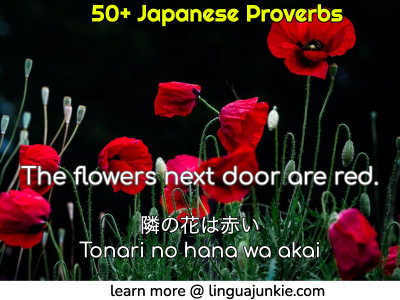
36) 隣の芝生は青い – Tonari no Shibafu ha aoi
Meaning: The neighbor’s grass is green
So, this Japanese proverb is very much the literal version of “the grass is greener on the other side.” Now, “aoi” might mean blue but actually, back in the day, Japan counted blue and green as the same color. Of course, not visually… but the 2 just fell under the same name. But that’s a story for another time.
Key words:
- 隣 – tonari – next/next door/next door neighbor
- 芝生 – shibafu – grass/lawn
- 青い – aoi – blue
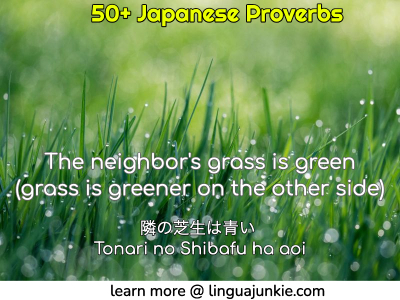
37) 上には上がある – Ue ni mo ue ga aru
- Meaning: Even the top has a top.
In other words, no matter how good you are, there’s always someone better than you. But, you shouldn’t be too worried about that.
Key words:
- 上 – Ue – Top, Above

38) 天は自ら助くるものを助く – Ten wa mizukara tasukuru mono o tasuku
- Meaning: Heaven helps those who help themselves.
If there is a heaven, that is. But, preparation is important, heaven or not.
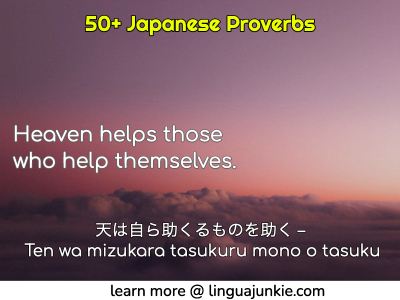
Key words:
- 天 – Ten – heaven
- 自ら – Mizukara – oneself
- 助くる – Tasukuru – to help/assist
- 助く – Tasuku – to help/assist
39) 氏より育ち – Uji yori sodachi
- Meaning: Raising over birth
This is the Japanese version of “nature vs. nurture” except it claims that nurture, growth, or how you’re raised has greater influence on your development rather than your nature – or birth, genetics, etc.
Key words:
- 氏 – Uji – Birth, Lineage
- 育ち- Sodachi – Breeding, Growth
- Good to know – 育つ – Sodatsu (verb) – means “to be raised”
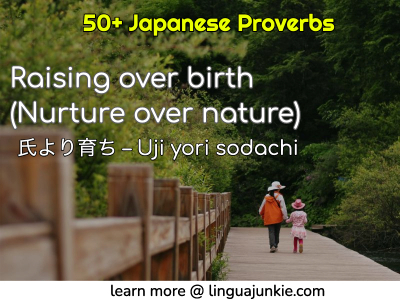
40) 論より証拠 – ron yori shouko
- Meaning: Proof over theory.
Well, more so, proof beats any argument, debate or discussion. There’s no point in arguing. Just present the proof and lets move on.
Key words:
- 論 – Ron – Discussion, Debate, Argument, Theory
- 証拠 – Shouko – Evidence, Proof

41) 良薬は口に苦し – Ryouyaku wa kuchi ni nigashi
- Meaning: Good medicine tastes bitter.
Or, the best advice is the one you’re afraid of hearing. Tough love. And brutal honesty. And thus, effective/good medicine is bitter, if you wish to take it.
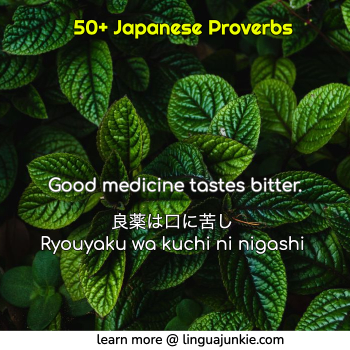
Key words:
- 良薬 – Ryouyaku – Good medicine
- 口 – Kuchi – Mouth
- 苦し – Nigashi – Bitter
- Relevant: 苦い – Nigai (adjective) means bitter.
42) 縁側の下の力持ち – Engawa no shita no chikaramochi
Literal meaning: There’s a powerful person underneath the porch/veranda
What’s this mean? It means there’s always a powerful person somewhere in the background, making the decisions and pulling the strings. In this case, he’s under the porch or deck. This refers to the old style traditional Japanese homes that have an elevated deck/porch.
Key words:
- 縁側 – Engawa – Veranda, Porch, Balcony
- 下 – Shita – Under
- 力持ち – Chikaramochi – Muscleman, strong man
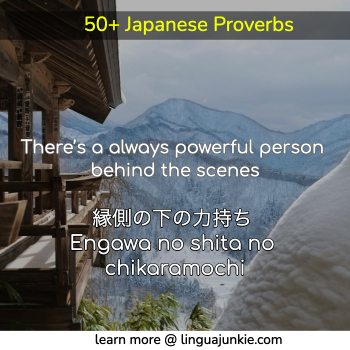
43. 勝って兜の緒を締めよ – Katte kabuto no o wo shimeyo
- Meaning: After victory, tighten your helmet strap.
This is another one of my most favorite Japanese proverbs.
Just because you have some good news and good luck doesn’t mean you should relax. This is a Japanese samurai proverb that advises to stay on alert despite victory. Because when you relax, that’s when an attack (or bad luck) can sneak up on you.
Key words:
- 勝つ – Katsu – To win
- 兜 – Kabuto – Helmet
- 緒 – O – Strap
- 締める – Shimeru – To fasten
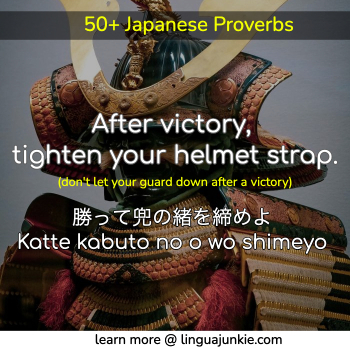
44. 蓼食う虫も好き好き – Tade kuu mushi mo sukizuki
- Meaning: Some bugs gladly eat knotweed.
The overall meaning of this proverb is – to each his own – or – there’s no arguing over taste. And in this case, while the lot of you might not like to eat knotweed, someone does. Some bugs do. To each his own.
Key words:
- 蓼 – Tade – knotweed
- 虫 – Mushi – Bug
- 食う – Kuu – To eat (Yes, like Taberu but a lot more casual)
- 好き好き- Sukizuki – Matter of taste
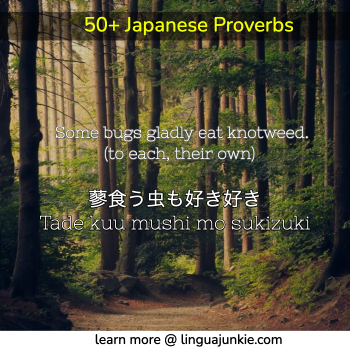
45. 類は友を呼ぶ – Rui wa tomo wo yobu
- Meaning: Similar types call (each other) friends
This is the Japanese idiom for “birds of a feather flock together.” In other, similar people, whether by personality or interest prefer the company of one another. They understand each other. And thus, they call each other friends.
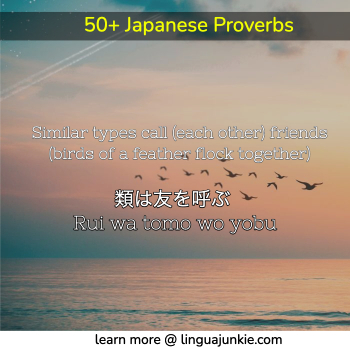
46. 乞食を三日すればやめられぬ – Kojiki o mikka sureba yamerarenu
- Meaning: If you’re a beggar for 3 days, you won’t be able to stop
Best way to predict a person’s behavior? Their past actions. This proverb is a good example of human psychology. Once you start doing something, chances are you’ll continue.
Someone that has a track history lying will probably lie in the future. And someone who has a history of eating lots of cake will continue to eat lots of cake. Another variation is “once a beggar, always a beggar” or “once ____, always _____.”
Key words:
- 乞食 – Kojiki – Beggar
- 三日 – Mikka – 3 days
- やめる – Yameru – To stop
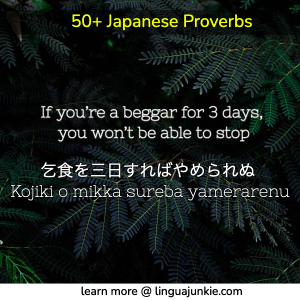
47. 有るは無いに勝る– Aru wa nai ni masaru
- Meaning: to have (something) is better than nothing
Isn’t it? Just a proverb that reminds you to be happy with what you have. Something is better than nothing. Something can grow into something bigger. Be happy that you’re learning some Japanese and don’t stress that you aren’t “fluent” yet. You’ll be there soon enough.
Key words:
- 勝る – Masaru – To surpass, to exceed’

48. 痘痕も笑窪 – Abata mo ekubo
- Meaning: Pimples can be dimples (when in love)
Yes, this is a Japanese love proverb! Meaning, that even a pockmark (a pimple/pimple scar) can be as appealing as a dimple. When one is in love, pockmarks or other defects become “dimples.” Or perhaps you just haven’t been in love yet.
Key words:
- 痘痕 – Abata – Pockmark
- 笑窪 – Ekubo – Dimple
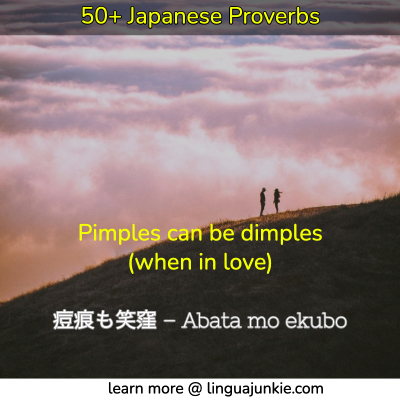
49. 遊び人暇なし – Asobi-nin hima nashi
- Meaning: Pleasure seekers have no free time
Why? People that chase fun, activities, and overall busy-ness and pleasure are always consumed by it to ever have “free” time. Basically a proverb that points out that being “busy” isn’t always a good thing. Especially those that have no meaning in life, thus creating useless business. While you’re chasing one thing, then another – time’s flying by.
Key words:
- 遊び人 – Asobinin – Pleasure seeker, playboy, gambler
- 人暇 – Hima – Free time, spare time
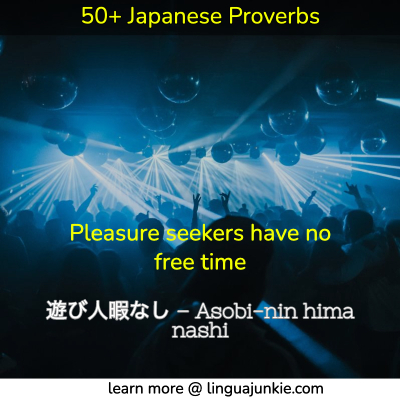
50. 明日は明日の風が吹く – Ashita wa ashita no kaze ga fuku
- Meaning: Tomorrow, tomorrow’s wind will blow
The meaning behind this is that “tomorrow is a new day.” Tomorrow, the wind will blow again. And just as it blows again, you to have another chance – again – to learn more Japanese!
Key words:
- 明日 – Ashita – Tomorrow
- 風 – Kaze – Wind
- 吹く- Fuku – To blow
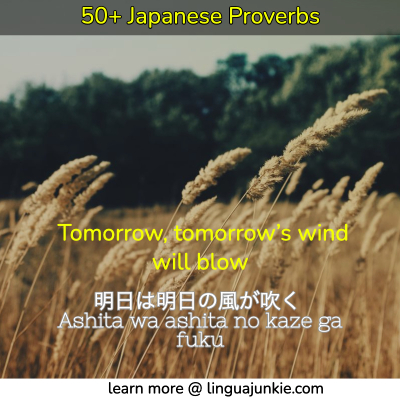
51. 明日のことをいうと天井の鼠が笑う – Ashita no koto wo iu to tenjou no nezumi ga warau
- Meaning: Speak of tomorrow and the rats in the ceiling will laugh
Why? Because you can’t predict tomorrow! Yes, tomorrow’s a new day but overall, the new day cannot be predicted… and the rats that are snugly lodged in your ceiling are laughing hard.
Key words:
- 天井 – Tenjou – Ceiling
- 鼠 – Nezumi – Mouse
- 笑う – Warau – Laugh
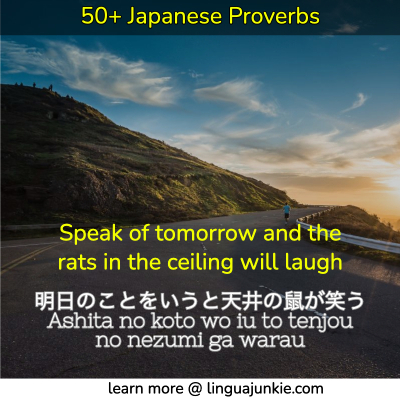
52. 相手のない喧嘩はできぬ – Aite no nai kenka wa dekinu
- Meaning: A fight without a partner cannot be had
The Japanese culture is totally about harmony. So, the best way to avoid a fight? Don’t get the other person a “partner” or a “rival.” Walk away. Without another fighter, there is no fight.
Granted, you do need a challenge and a “partner” to improve in a skill, but this Japanese proverb is more about unnecessary fights/conflicts rather than “growing” and “improving” by having a partner that challenges you.
Key words:
- 相手 – Aite – Partner
- 喧嘩 – Kenka – Fight
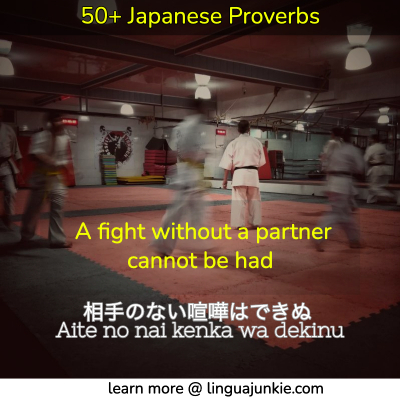
Now, for the next batch, let’s focus on a specific set of Japanese proverbs…
Japanese proverbs about success.
And before we start, so you know, the Japanese word and kanji (symbol) for success are:
- Kanji: 成功
- Hiragana: せいこう
- Pronunciation: Seikou
53. He who runs after two hares will catch neither.
- 二兎追うもの一兎も得ず。
- Nito ou mono itto mo ezu.
If you try doing two things at once, you’ll fail both of them. In this case, you cannot catch two rabbits at once. Choose one. Focus on it. Choose one thing for now. Focus on becoming really good at it.
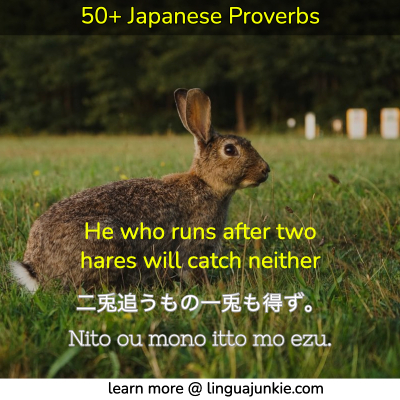
54. The sum of the year is on New Year’s day.
- 一年の計は元旦にあり。
- Ichinen no kei wa gantan ni ari.
- Meaning: Preparation and planning are the foundations of success.
The translation is “The sum of the year is on New Year’s day.”
What’s the connection between the literal translation and the meaning?
Well, if you worked at something for 365 days of the year, you’ve been preparing and improving all year round. That builds up. That way, on the next New Year’s Day, your ability/skill the sum of your hard work from the past year.
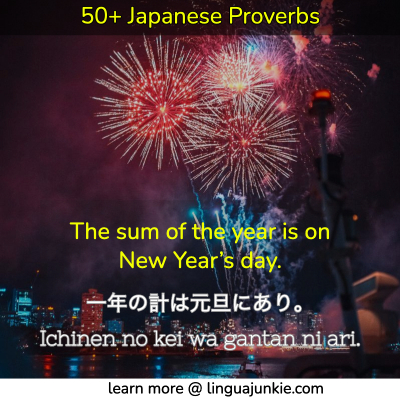
55. To rush is good.
- 善は急げ。
- Zen wa isoge.
- Meaning: “It is good to hurry” or “strike while the iron’s hot.”
Sure, rushing all the time isn’t always good, but when an opportunity presents itself – you better grab it. It’s zen to rush.
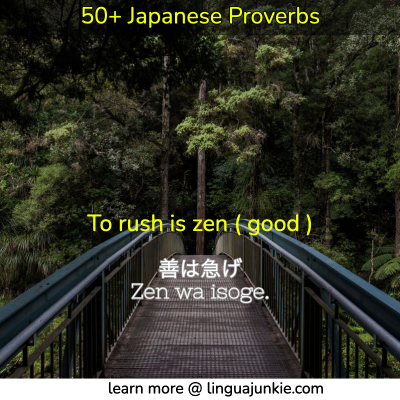
56. Haste makes waste.
- 急がば回れ。
- Isogaba maware
- Meaning: Haste makes waste.
So, the translation is: “If you rush, you’ll go around in circles.”
A bit contradictory given the previous proverb, right? Well, not all rushing and busyness is necessary. Most of the time, people make themselves busy with useless things… instead of focusing on what’s important.
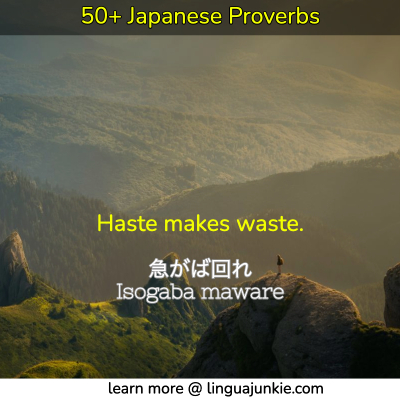
Besides, if you rush through your work, you won’t be doing a good job.
57. Failure is the stepping stone to success.
- 失敗は成功のもと
- Shippai wa seikou no moto
- Meaning: Failure is the stepping stone to success
The literal translation is “Failure is the origin/foundation of success.” You get the point. In other words, failure teaches us what actions should we change in order to achieve success.

58. Even Buddhist teachings scrolls have brush slips.
- 弘法にも筆の誤り。
- Koubou ni mo fude no ayamari.
- Meaning: Even the greatest expert or master sometimes fails.
The literal translation is: Even Buddhist teaching scrolls/scripts have some brush slips.
Anyone can make a mistake. Nobody’s perfect. This is another one of those Japanese proverbs about “everyone makes mistakes.” And in this case, it’s the Buddhist scrolls that have brush slips and errors.

Conclusion: Japanese Proverbs
There are a whole lot of beautiful Japanese words and Japanese proverbs out there.
And now that you’re here at the bottom, you know a whole lot of proverbs.
Which one of these Japanese proverbs was your favorite?
Leave me a comment!
– The Main Lingua Junkie
P.S. Interested in learning Japanese? This Japanese course for Absolute Beginners from JapanesePod101 is FREE for a limited time only. They plan to close it down in the future, but while it’s still open, give it a try. Click the image below.

What does this say?
[…] part 1 here. Part 2 here. Part 3 […]
[…] By The Junkie On October 11, 2014 · Leave a Comment […]
[…] Read part 1 here. […]